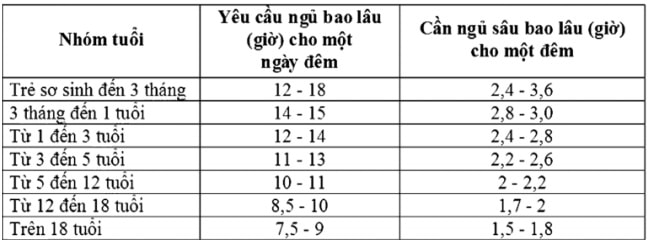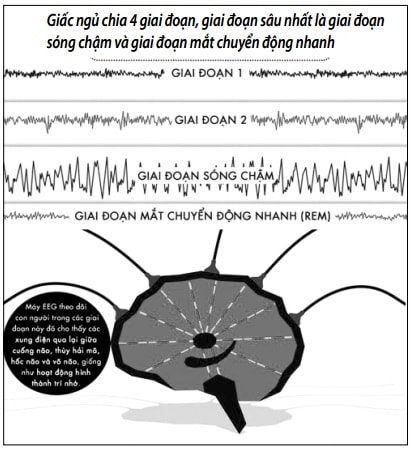How much deep sleep is enough?
In today's work-life vortex, cutting back on sleep to achieve career goals is quite common.
A common misconception is that you are missing out if you spend a lot of time sleeping in your daily life. However, the reality is that not getting as much sleep as you want is not possible, and not getting the minimum amount of sleep, the most important of which is deep sleep, can have a negative impact on your energy, mood, and ability to handle stress. So exactly how much deep sleep do you need per night?
Explore sleep
Your body goes through many changes while you sleep. The first stage is non-REM sleep. Your eyes move quickly in all directions when you are in REM.
During non-REM sleep, your eyes don’t move much and you’ll go through the following stages: The first stage is when you start to fall asleep, but are easily awakened. This stage usually lasts up to 10 minutes. Next comes the second stage – light sleep. Your heart rate slows down and your body temperature drops. You’ll soon enter deep sleep.
You will then enter a deep sleep stage and it is often difficult to wake you up from this stage. You will often feel disoriented for a few minutes when someone wakes you from deep sleep. After deep sleep, your brain becomes active. This is REM sleep and you often dream during this REM stage.
 |
| Deep sleep plays an important role in reducing the amount of sleep you get during the day. |
Slow-wave sleep, delta-wave sleep, and even N3 all refer to deep sleep. Experts call it delta-wave sleep because low-frequency delta waves can be seen in the EEG when you are in deep sleep. Previously, stage three (deep sleep) was divided into two stages – stage 3 and stage 4 – but recently they have been combined into one and named stage N3, also known as regular sleep, slow-wave sleep, or deep sleep.
The important role of deep sleep
Deep sleep plays an important role in reducing your sleep time during the day. Many documents have mentioned a very special method that helps you sleep only a few hours a day but still be completely healthy and awake. It is called the scientific sleep method (polyphasic sleep) that was once applied by the famous artist Leonardo De Vinci to have more time for research, invention and artistic creation, this method needs further verification. During this stage, your internal organs detoxify, your kidneys clean your blood, your body will replace new cells, heal wounds and create new muscle tissue. All of this will help to energize you for the next day.
 |
 |
| Different stages of sleep help consolidate different types of memories. |
Some studies suggest that at least 20% of your total sleep time should be spent in deep sleep. Since most adults need 8-9 hours of sleep a night, this means they will need about 1.6-1.8 hours of deep sleep to feel fully energized the next day. However, the amount of deep sleep varies and is largely due to the change in sleep needs in different age groups, specifically (see table).
Tips for achieving deep sleep
Now that you know the answer to the question “How much deep sleep do you need a night?” you must learn how to achieve deep sleep regularly.
Follow a transitional routine to prepare for sleep: Create a habit of doing something before bed that signals your body that it's time to relax and sleep. It can be as simple as washing your face, taking a shower, brushing your teeth.
Choose the right pillow: Using a neck pillow can improve the quality of your sleep. A pillow of the right height and softness will help you fall asleep.
Eat a banana: End your day by eating a banana. Bananas contain tryptophan, a sleep-inducing hormone that can improve the quality of your sleep, so eat a banana a few hours before bed.
Take a hot shower: Your body will relax faster if you take a hot shower, but you need to take it at least 90-120 minutes before going to bed. Also, make sure that the water temperature from the shower is around 40 degrees Celsius.
Wear pajamas to sleep: Instead of sleeping naked, wear pajamas to keep your skin warm, which acts as a signal to your brain that it's time to sleep. Just don't wear too much, as your body goes through several cool-warm cycles throughout the night.
Don't sleep with pets in bed: Pets have different sleep-wake cycles than humans, so sleeping with pets will make it difficult for you to get deep sleep.
Relaxing massage before bed: Use your fingers to massage your eyes in a slow, circular motion. Then move down to your mouth and neck. Continue moving down your body until you feel relaxed and ready to sleep.
Sprinkle perfume lightly on your bed and pillows: Your favorite perfume makes you feel relaxed and helps you fall asleep and sleep soundly throughout the night.
Enjoy music before bed: Instead of reading a book, listen to music. This will calm your brain and relax your nerves.
According to SK&DS
| RELATED NEWS |
|---|

.jpg)





.jpg)

